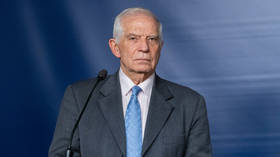Russian shares hold ground, and then advance, after trade resumes
Moscow RTS and Micex exchanges moved higher on Tuesday after trading was halted for 2 hours in the morning. The halt was called after a wave of selling engulfed Asian markets and U.S. Markets overnight after the U.S. House of Representatives rejected a p
Trading resumed at 12.30 with both exchanges remaining below the starting mark until late in the afternoon, after the opening on Wall street. The Federal Financial Markets Service introduced changes to operating provisions meaning that the markets may again cease trading if price changes reach 5%, instead of the previous limit of 8%, and if the technical index changes more than 10%, as opposed to the previous limit of 12%. The FFMS has also indicated that exchanges may extend trading hours to 19.00 (7 PM) Moscow time. Trade in Sberbank shares was halted at 17.30 Moscow time after they had risen by more than 10%
In the immediate aftermath of the vote in the United states on Monday evening, the Dow Jones index slumped to close nearly 7% down. On Tuesday the Dow opened higher on expectation that that some form of bail out of the U.S. banking system would be approved by the end of this week. Trade in Europe has seen the FTSE move higher with losses in the banking sector being offset by gains in resources, and the Dax and Cac both slightly lower.
The U.S House of Representatives voted 228 against 205 to reject a proposed $700 Billion bail out of the U.S. Financial system, which would have given Treasury Secretary Henry Paulson unprecedented powers to buy out troubled mortgage-backed assets from the U.S. banking system in an attempt to renew confidence and stimulate lending.
The proposed bail out was supported by U.S. President George. W. Bush, and contenders for the upcoming U.S. Presidential election John McCain and Barrack Obama. In the wake of the vote President Bush expressed disappointment, with Treasury Secretary Paulson adding that time was running out and that “We need to work as quickly as possible.”
Sam Stovall, Senior Equities Strategist at Standard & Poor’s noted of the vote, and the reaction to it, “I’m sort of surprised in the fact that the market was unhappy that it was going to pass, and then it was even more unhappy when it didn’t pass. So I think the market is saying that it doesn’t really like what was being proposed to it, but at the same time it realised we have to do something.”
In further news to undermine investors sentiment on Tuesday, Dutch-Belgian lender, Dexia, received a €6.4bn capital injection from governments and shareholders in what amounts to the 4th major banking bailout in 2 days. It follows Mondays purchase of Wachovia by Citigroup in the United States, the nationalization of Bradford & Bingley in the United Kingdom, with the subsequent sale of its assets to Spain’s Banco Santander, the partial nationalization of Belgian-Dutch banking and insurance group Fortis, and the nationalization of Icelandic bank Glindir. All have taken place to fend off the possibility of collapse of institutions involved.












